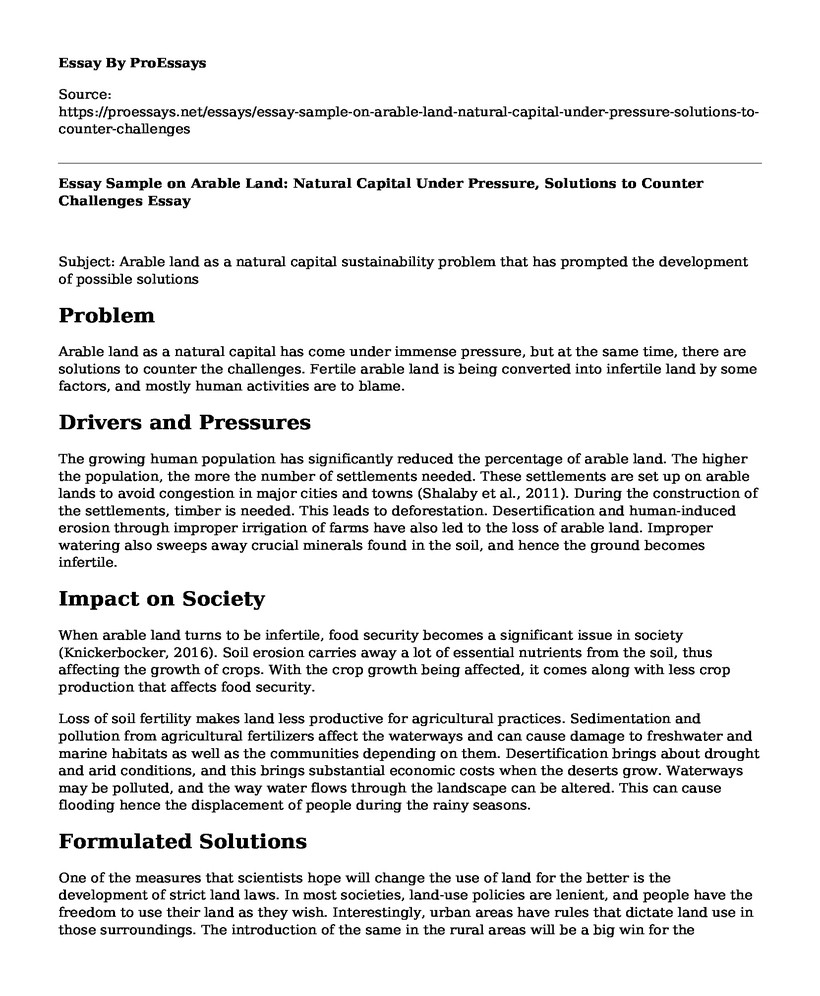Subject: Arable land as a natural capital sustainability problem that has prompted the development of possible solutions
Problem
Arable land as a natural capital has come under immense pressure, but at the same time, there are solutions to counter the challenges. Fertile arable land is being converted into infertile land by some factors, and mostly human activities are to blame.
Drivers and Pressures
The growing human population has significantly reduced the percentage of arable land. The higher the population, the more the number of settlements needed. These settlements are set up on arable lands to avoid congestion in major cities and towns (Shalaby et al., 2011). During the construction of the settlements, timber is needed. This leads to deforestation. Desertification and human-induced erosion through improper irrigation of farms have also led to the loss of arable land. Improper watering also sweeps away crucial minerals found in the soil, and hence the ground becomes infertile.
Impact on Society
When arable land turns to be infertile, food security becomes a significant issue in society (Knickerbocker, 2016). Soil erosion carries away a lot of essential nutrients from the soil, thus affecting the growth of crops. With the crop growth being affected, it comes along with less crop production that affects food security.
Loss of soil fertility makes land less productive for agricultural practices. Sedimentation and pollution from agricultural fertilizers affect the waterways and can cause damage to freshwater and marine habitats as well as the communities depending on them. Desertification brings about drought and arid conditions, and this brings substantial economic costs when the deserts grow. Waterways may be polluted, and the way water flows through the landscape can be altered. This can cause flooding hence the displacement of people during the rainy seasons.
Formulated Solutions
One of the measures that scientists hope will change the use of land for the better is the development of strict land laws. In most societies, land-use policies are lenient, and people have the freedom to use their land as they wish. Interestingly, urban areas have rules that dictate land use in those surroundings. The introduction of the same in the rural areas will be a big win for the agricultural sector. The new measures being put in place seek to prohibit the use of agricultural land for other purposes.
On the same note, strategies are being put in place to help in controlling the population. A surge in population numbers is mostly to blame for the destruction of arable land as people look for settlements. Unfortunately, it primarily affects the poor societies that have problems with education. Family planning is one of the unique programs that the globe has been advocating to control population growth. With the family planning policies being put in place, arable land will be free from destruction by individuals looking for a place to settle.
Solution Analysis
The two solutions highlighted have a high probability of succeeding. First, human beings have brains, and whenever policies are put in place, they will be followed. On the same note, the proposed law is very definite on the consequences that will occur those that fail to comply. With that fear alone, the policy is likely to be a success. At the same time, education on population control approaches is expected to bear fruits since most of the members are not informed on how to go about the same.
Final Word
The proposed policies will come at a cost to society. People will need to be educated on the essence of the principles being undertaken before they are imposed on them. The issue of population control will affect individuals directly, thus the need for a direct attachment. With the two in place, arable land as a natural capital will be reserved, and there will hardly be issues of food insecurity.
References
Knickerbocker, B. (2016, July 26). Growing threats to the world's farmland. Retrieved from https://www.csmonitor.com/1993/0726/26133.html
Shalaby et al. (2011). Threats and challenges to sustainable agriculture and rural development in Egypt: Implications for agricultural extension. The Journal of Animal & Plant Sciences, 21(3), 581-588. Retrieved from https://www.researchgate.net/publication/266090181_Threats_and_challenges_to_sustainable_agriculture_and_rural_development_in_Egypt_Implications_for_agricultural_extension
Cite this page
Essay Sample on Arable Land: Natural Capital Under Pressure, Solutions to Counter Challenges. (2023, Apr 10). Retrieved from https://proessays.net/essays/essay-sample-on-arable-land-natural-capital-under-pressure-solutions-to-counter-challenges
If you are the original author of this essay and no longer wish to have it published on the ProEssays website, please click below to request its removal:
- Ecology Quiz Results Summary
- Super Volcano Apocalypse 2018
- Ban on Single-Use Plastic Bags: For and Against - Essay Sample
- Essay Example on Volkswagen Emission Scandal: Emissiongate Revealed
- Essay Sample on Australia's 2019-2020 Bushfire Crisis: A Tragic Tale
- Global Warming: Impact of Greenhouse Gases on Earth - Essay Sample
- Free Essay on Offshore Drilling: Balancing Economic Demands with Environmental Consequences







